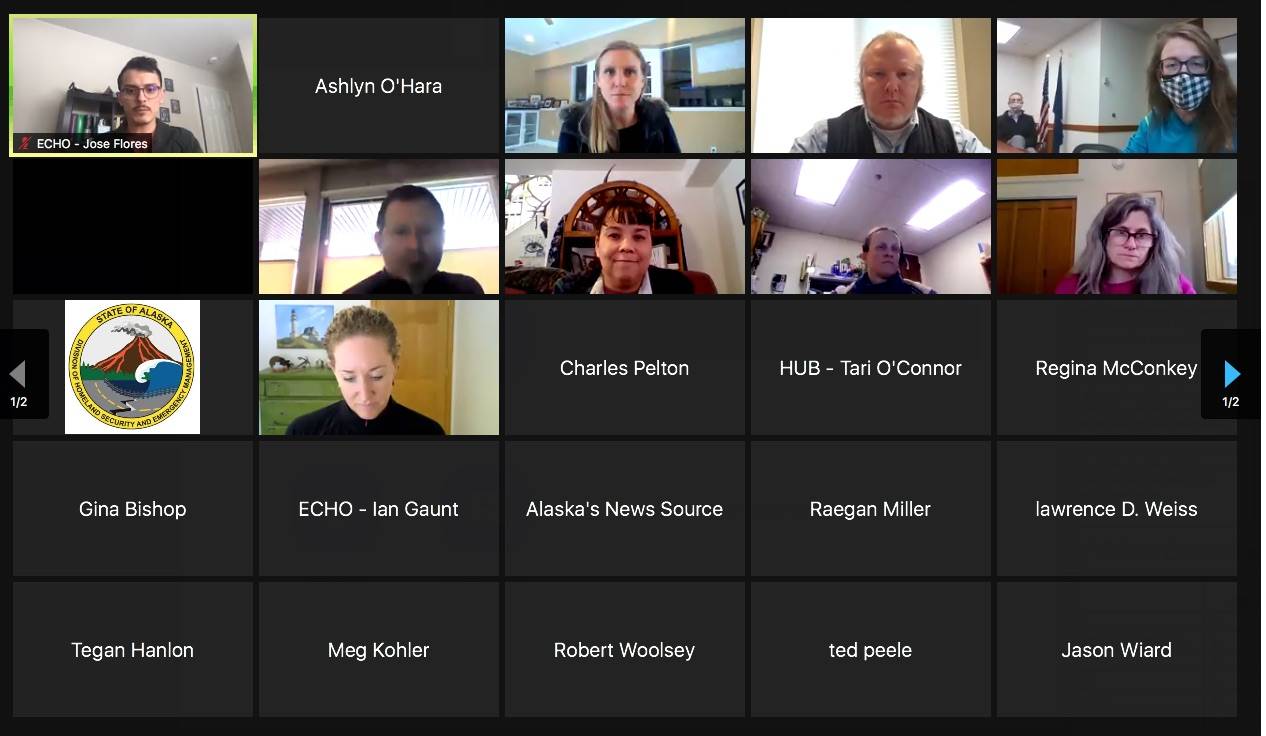The decision by Alaska state health officials to open the next tier of vaccine eligibility was made in part due to appointments not being filled quickly, officials said in a press briefing Thursday.
In a surprise announcement on Wednesday, the Alaska Department of Health and Social Services said that a new group of Alaskans would be able to schedule appointments to be vaccinated beginning Thursday. Prior to the announcement, state health officials had estimated that it would take through the end of February to vaccinate everyone in Phase 1b, Tier 1, which includes Alaskans 65 and older. Officials said Wednesday that about 52% of the state’s senior population has been vaccinated.
Officials said Thursday that the next group was opened because their COVID-19 vaccine appointments for seniors were not filling up quickly, which they said indicates that the initial demand has been met. Additionally, the state has more vaccines coming and opening up a larger group will give communities more flexibility in how quickly they can administer doses.
The group of people who became eligible to schedule vaccine appointments on Thursday includes Alaskans 50 and above who have high-risk medical conditions, education staff, limited pandemic response staff, front-line essential workers age 50 and older who work within 6 feet of others and people living or working in other congregate settings, with specific guidelines for each of those categories.
DHSS specifically identified which high-risk medical conditions make someone 50 or older eligible. They include cancer, chronic kidney disease, chronic obstructive pulmonary disorder (COPD), Down syndrome, heart conditions — such as heart failure, coronary artery disease or cardiomyopathies, immunocompromised state from solid organ transplant, obesity, severe obesity, sickle cell disease, smoking, Type 1 or Type 2 diabetes mellitus and pregnancy.
Education staff includes, regardless of age, pre-K through 12th grade educators and support staff — including custodial, food service and transportation, child care workers and support staff and Indigenous language and culture bearers.
Limited pandemic response staff include those who may come into contact with the SARS-CoV-2 virus during outbreak response activities.
Front-line essential workers 50 and older who work within 6 feet of others include law enforcement, public safety, first responders, food and agriculture workers, transportation and logistics workers, water, wastewater and utility workers, among others. A full list of who is included can be found on DHSS’ vaccine website at covidvax.alaska.gov.
Congregate settings include acute psychiatric facilities, correctional facilities, group homes for people with disabilities or mental and behavioral health conditions, homeless and domestic violence shelters, substance misuse and treatment residential facilities and transitional living homes.
People previously eligible to receive the vaccine are still able to schedule appointments to be vaccinated.
For the months of December, January and February, Alaska received an allocation of 174,400 pairs of vaccine, or 348,800 total doses including first and second doses. As of Thursday, 167,432 doses had already been administered, including 116,228 initial doses and 51,204 second doses, though those numbers are expected to be higher due to a lag in reporting. According to the state’s COVID-19 vaccination dashboard, 10,441 doses had been administered in the Kenai Peninsula Borough, including 7,806 initial doses and 2,635 second doses.
Alaska currently leads the nation in the percentage of the population that has received at least one dose. 15.4% of Alaska’s population has received at least one dose, according to NPR’s COVID-19 vaccine tracker. That is compared to the nationwide percentage of 10.2%.
The City of Kenai is offering transportation to and from vaccine clinics located in Kenai in partnership with CARTS and Alaska Cab. The city council approved $5,000 for the program at their Jan. 20 meeting. Rides will be offered on a first-come, first-served basis until the budgeted funds run out. In order to participate in the program, people must be going from an address located in Kenai to a clinic in Kenai and will need to provide proof of vaccination.
Instructions on how to schedule an appointment and a map of vaccine providers in the state can be found at covidvax.alaska.gov.
Case counts
The state reported 145 new COVID-19 cases in Alaska on Thursday, including 11 that were reported among nonresidents. Just one new case was reported on the Kenai Peninsula, in Homer.
As of Thursday, the borough was considered to be at intermediate risk level and had the second-lowest 14-day case rate in the state at 6.3 cases per 100,000 people.
The state also reported two new hospitalizations and no new deaths on Thursday, bringing the totals to date to 1,194 and 278, respectively. As of Thursday, there were 33 people hospitalized in Alaska because of COVID-19, including one who was considered a person under investigation for the disease. Six of the patients were on ventilators.
In addition to the one new case reported on the peninsula, the state also reported 62 cases in Anchorage, 15 in Wasilla, 13 in Palmer, 10 in Fairbanks, seven in Eagle River, seven in Kusilvak Census Area, four Bethel Census Area, two in Bethel, two in Juneau, two in Ketchikan and one each in Chugiak, Cordova, Haines, Hooper Bay, North Pole, Northwest Arctic Borough, Petersburg, Salcha and Yukon-Koyukuk Census Area.
Eleven nonresident cases were also reported. Six were reported in Unalaska. Three were reported in Aleutians East Borough and two were reported in Fairbanks.
More information about the COVID-19 in Alaska can be found on DHSS’ website.
Reach reporter Ashlyn O’Hara at ashlyn.ohara@peninsulaclarion.com.

